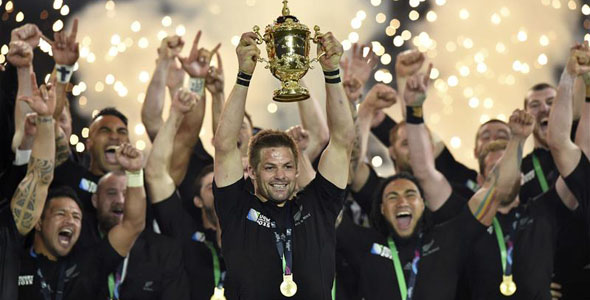The 2015 iSportconnect Sport Industry Review
December 18, 2015
By Christian Radnedge
To say it’s been an eventful year in the sports industry would almost be an understatement.
With large-scale competitions, rx elections, unhealthy and even corruption scandals there has been much to discuss and debate – especially at our many exclusive events.
2024 Olympic Bid
The year began with the United States Olympic Committee triumphantly announcing they had chosen Boston as their candidate city to bid to host the 2024 Olympic and Paralympic Games. Local residents were not so keen however, and just six months later in July the city’s bid had been dropped – being replaced by two-time host Los Angeles at the last minute.

At the time of writing there are four bids in contention for the Games; Budapest, Los Angeles, Paris and Rome, with Hamburg having dropped out last week due to a lack of public support. International Olympic Committee president Thomas Bach’s Agenda 2020 changes to the bidding process already look to have had an impact, with cities more scrutinising in their approach to applying for the massive sports showpiece.
SportAccord
 It looks like the remaining candidate cities will not be showcasing themselves in the future at SportAccord, after former president Marius Vizer launched a stinging attack on the IOC and president Bach in his opening speech at this year’s convention in Sochi.
It looks like the remaining candidate cities will not be showcasing themselves in the future at SportAccord, after former president Marius Vizer launched a stinging attack on the IOC and president Bach in his opening speech at this year’s convention in Sochi.
A number of international federations suspended their membership of umbrella-body SportAccord in protest at Vizer’s criticism of the Olympic movement. Thousands tuned into iSportconnect’s rolling coverage as the Hungarian moved to calm waters but the damage had been done. He later resigned as president, being succeeded by the head of the International Tennis Federation Francesco Ricci Bitti.

Premier League TV Rights
In February, the Premier League landed a significant payday after securing a £5.1 billion sale of its broadcasting rights to Sky and BT Sport for the seasons 2016 to 2019.
It goes some way to explain why the Premier League felt they could afford to drop title sponsorship from next year when its contract with Barclays runs out.
FIFA
Meanwhile, May 2015 could go down as one of the most infamous months in sporting history.
Just two days before the FIFA presidential election in Zurich, dawn raids by Swiss police saw several FIFA officials arrested as part of an investigation into corruption in world football by the US Department of Justice.
iSportconnect’s Christian Radnedge was in Switzerland to report on Sepp Blatter beating challenger Prince Ali bin al-Hussein of Jordan to secure a fifth term in office as head of FIFA.

However, not long after winning the support of the majority of FIFA’s 209 member associations, the 79-year-old announced he was to step down at an extraordinary congress next year.
As of writing, there are five challengers bidding to succeed Blatter as FIFA president: Prince Ali, Jerome Champagne, Tokyo Sexwale, Gianni Infantino, Sheikh Salman bin Ibrahim Al-Khalifa.
The FIFA scandal meant that there was a light presence of world football’s governing body at the 2015 FIFA Women’s World Cup in Canada, a tournament that shattered records in attendance, TV figures – especially in the United States – and digital interaction for the competition.
IAAF
The IAAF World Athletics Championships in Beijing saw the Chinese capital finally using its iconic Bird’s Nest Stadium from the 2008 Olympics in another multi-sport capacity.
The month of August also saw new leadership at the IAAF, with iSportconnect staying up all night in the UK to liveblog proceedings where Seb Coe succeeded Lamine Diack as head of world athletics.

The euphoria around Coe’s triumph would soon dissipate as the Briton had to deal with the revelations surrounding Russia’s historic systematic doping programme, as discovered by German broadcaster ARD and The Sunday Times.
An independent World Anti-Doping Commission confirmed the allegations and the IAAF council voted to suspend the All-Russia Athletics Federation until the country became compliant with the WADA code.
The ban puts their participation at the Rio Olympics in 2016 at risk. But Sports Minister Vitaly Mutko has insisted his country will do all it can to cooperate with anti-doping measures and regain its status in the world of track and field.
Rugby World Cup
But while the fallout from athletics and FIFA continues, the world of rugby can hold its head high after a hugely successful Rugby World Cup in England.
It was not successful for the home nation, however, who exited the competition in the pool stage. Despite fears that this would trigger a decrease in interest and therefore potential profits, Rugby World Cup 2015 went on to deliver more than £250 million in ticket revenues alone, with an £80 million surplus for World Rugby and a £15 million surplus going to the RFU.
Pre-tournament boasts of England 2015 being the biggest Rugby World Cup ever were proved true as a record 2.5 million attended the tournament, while 120 million tuned in to watch the All Blacks defeat Australia 34-17 in the sell-out final at Twickenham to become the first team to win back-to-back World Cup titles.

The next Rugby World Cup takes place in Asia for the first time when Japan hosts in 2019.
But for now, the sport turns its focus to the debut of the sevens competition in the Olympics next year.
Once the clock ticks over to 2016, almost the entire sports industry starts counting down until the opening ceremony on August 5. You can be sure iSportconnect will be there every step of the way.
What were your highlights of 2015 in sport business? Let us know in our discussion HERE.
{jcomments on}



